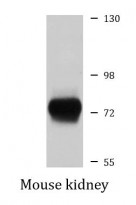ARG57406
anti-ASAH2 antibody
anti-ASAH2 antibody for Western blot and Human,Mouse,Rat
Overview
| Product Description | Rabbit Polyclonal antibody recognizes ASAH2 |
|---|---|
| Tested Reactivity | Hu, Ms, Rat |
| Tested Application | WB |
| Host | Rabbit |
| Clonality | Polyclonal |
| Isotype | IgG |
| Target Name | ASAH2 |
| Antigen Species | Human |
| Immunogen | Recombinant Protein of Human ASAH2. |
| Conjugation | Un-conjugated |
| Alternate Names | hCD; EC 3.5.1.23; HNAC1; LCDase; Acylsphingosine deacylase 2; Neutral ceramidase; NCDase; Non-lysosomal ceramidase; BCDase; N-CDase; N-acylsphingosine amidohydrolase 2 |
Application Instructions
| Application Suggestion |
|
||||
|---|---|---|---|---|---|
| Application Note | * The dilutions indicate recommended starting dilutions and the optimal dilutions or concentrations should be determined by the scientist. | ||||
| Positive Control | Mouse kidney |
Properties
| Form | Liquid |
|---|---|
| Purification | Affinity purification with immunogen. |
| Buffer | PBS (pH 7.3), 0.02% Sodium azide and 50% Glycerol. |
| Preservative | 0.02% Sodium azide |
| Stabilizer | 50% Glycerol |
| Storage Instruction | For continuous use, store undiluted antibody at 2-8°C for up to a week. For long-term storage, aliquot and store at -20°C. Storage in frost free freezers is not recommended. Avoid repeated freeze/thaw cycles. Suggest spin the vial prior to opening. The antibody solution should be gently mixed before use. |
| Note | For laboratory research only, not for drug, diagnostic or other use. |
Bioinformation
| Database Links | |
|---|---|
| Gene Symbol | ASAH2 |
| Gene Full Name | N-acylsphingosine amidohydrolase (non-lysosomal ceramidase) 2 |
| Background | Ceramidases (EC 3.5.1.23), such as ASAH2, catalyze hydrolysis of the N-acyl linkage of ceramide, a second messenger in a variety of cellular events, to produce sphingosine. Sphingosine exerts both mitogenic and apoptosis-inducing activities, and its phosphorylated form functions as an intra- and intercellular second messenger (see MIM 603730) (Mitsutake et al., 2001 [PubMed 11328816]).[supplied by OMIM, Mar 2008] |
| Function | Hydrolyzes the sphingolipid ceramide into sphingosine and free fatty acid at an optimal pH of 6.5-8.5. Acts as a key regulator of sphingolipid signaling metabolites by generating sphingosine at the cell surface. Acts as a repressor of apoptosis both by reducing C16-ceramide, thereby preventing ceramide-induced apoptosis, and generating sphingosine, a precursor of the antiapoptotic factor sphingosine 1-phosphate. Probably involved in the digestion of dietary sphingolipids in intestine by acting as a key enzyme for the catabolism of dietary sphingolipids and regulating the levels of bioactive sphingolipid metabolites in the intestinal tract. [UniProt] |
| Calculated MW | 86 kDa |
| PTM | N-glycosylated. Required for enzyme activity (By similarity). O-glycosylated. Required to retain it as a type II membrane protein at the cell surface. Phosphorylated. May prevent ubiquitination and subsequent degradation (By similarity). Ubiquitinated, leading to its degradation by the proteasome. Ubiquitination is triggered by nitric oxid (By similarity). |
Images (1) Click the Picture to Zoom In






